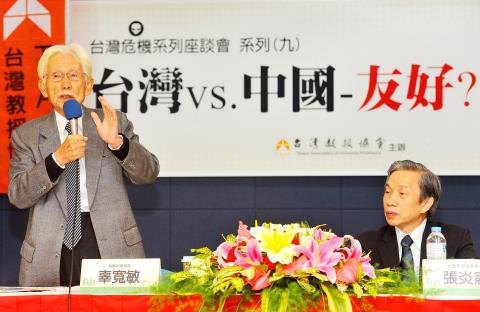The Democratic Progressive Party (DPP) has yet to figure out why it lost this year’s presidential election and remains directionless almost one year later, independence advocate Koo Kwang-ming (辜寬敏) said yesterday.
Koo, one of the most vocal heavyweights in the pro-independence camp, expressed his disappointment with the party in a speech delivered at an event organized by the Taiwan Association of University Professors.
“I waited for almost one year before expressing my views today. Did the DPP conduct a comprehensive review of the election to understand why it lost? From what I’ve seen, the party hasn’t changed and factionalism still dominates its Central Standing Committee,” the 87-year-old said.

Photo: Chien Jung-fong, Taipei Times
Koo also expressed a particular displeasure with DPP Chairman Su Tseng-chang (蘇貞昌), former party chairperson and presidential candidate Tsai Ing-wen (蔡英文), and former premier Frank Hsieh (謝長廷) in his 90-minute speech.
The DPP cannot possibly hope to regain the people’s trust by waiting for President Ma Ying-jeou (馬英九) and his Chinese Nationalist Party (KMT) to fail, Koo said, adding that the DPP’s approval rating remained low despite Ma’s own dismal 13 percent approval figures.
Koo praised Su’s efforts to visit local communities and reconnect with grassroots supporters, but criticized the party headquarters for “taking people’s support for granted and sitting idle amid Ma’s incompetence.”
The DPP should have been more vocal in its efforts to recall the president and amend the Constitution, he told the audience.
Regarding Tsai, Koo said her US affairs campaign team had been understaffed, with DPP Legislator Hsiao Bi-khim (蕭美琴) serving as the sole aide. The campaign team had underestimated the importance of Tasi’s US visit, the mismanagement of which had significantly hurt her election bid, he said.
Koo said Hsieh’s remarks during his landmark visit to China in October were “inappropriate” and he disagreed with the former premier’s initiative of “one Constitution with different interpretations (憲法各表).”
“The DPP is the only hope Taiwanese have because the Taiwan Solidarity Union remains weak. The DPP has to keep up with the times and reignite people’s passion for politics,” Koo said.
Ma’s low approval rating reflects not only his “incompetence, carelessness and cold-bloodedness,” but also the people’s opposition to his administration, Koo said.
In terms of cross-strait relations, the senior politician said Beijing’s Taiwan strategy “has been a total failure” because anti-China sentiment among Taiwanese has increased.
“I boldly predict that China will not annex Taiwan by force because doing so could place its economy at risk of being hit by international economic sanctions,” he said.

A preclearance service to facilitate entry for people traveling to select airports in Japan would be available from Thursday next week to Feb. 25 at Taiwan Taoyuan International Airport, Taoyuan International Airport Corp (TIAC) said on Tuesday. The service was first made available to Taiwanese travelers throughout the winter vacation of 2024 and during the Lunar New Year holiday. In addition to flights to the Japanese cities of Hakodate, Asahikawa, Akita, Sendai, Niigata, Okayama, Takamatsu, Kumamoto and Kagoshima, the service would be available to travelers to Kobe and Oita. The service can be accessed by passengers of 15 flight routes operated by

GIVE AND TAKE: Blood demand continues to rise each year, while fewer young donors are available due to the nation’s falling birthrate, a doctor said Blood donors can redeem points earned from donations to obtain limited edition Formosan black bear travel mugs, the Kaohsiung Blood Center said yesterday, as it announced a goal of stocking 20,000 units of blood prior to the Lunar New Year. The last month of the lunar year is National Blood Donation Month, when local centers seek to stockpile blood for use during the Lunar New Year holiday. The blood demand in southern Taiwan — including Tainan and Kaohsiung, as well as Chiayi, Pingtung, Penghu and Taitung counties — is about 2,000 units per day, the center said. The donation campaign aims to boost

ENHANCING EFFICIENCY: The apron can accommodate 16 airplanes overnight at Taoyuan airport while work on the third runway continues, the transport minister said A new temporary overnight parking apron at Taiwan Taoyuan International Airport is to start operating on Friday next week to boost operational efficiency while the third runway is being constructed, the Ministry of Transportation and Communications said yesterday. The apron — one of the crucial projects in the construction of the third runway — can accommodate 16 aircraft overnight at the nation’s largest international airport, Minister of Transportation and Communications Chen Shih-kai (陳世凱) told reporters while inspecting the new facility yesterday morning. Aside from providing the airport operator with greater flexibility in aircraft parking during the third runway construction,

MORE FALL: An investigation into one of Xi’s key cronies, part of a broader ‘anti-corruption’ drive, indicates that he might have a deep distrust in the military, an expert said China’s latest military purge underscores systemic risks in its shift from collective leadership to sole rule under Chinese President Xi Jinping (習近平), and could disrupt its chain of command and military capabilities, a national security official said yesterday. If decisionmaking within the Chinese Communist Party has become “irrational” under one-man rule, the Taiwan Strait and the regional situation must be approached with extreme caution, given unforeseen risks, they added. The anonymous official made the remarks as China’s Central Military Commission Vice Chairman Zhang Youxia (張又俠) and Joint Staff Department Chief of Staff Liu Zhenli (劉振立) were reportedly being investigated for suspected “serious